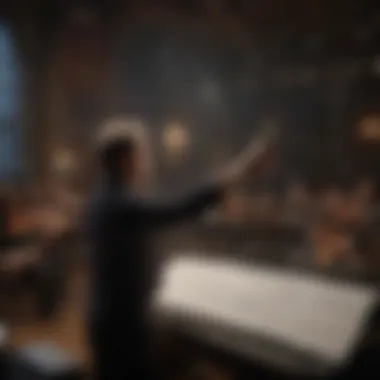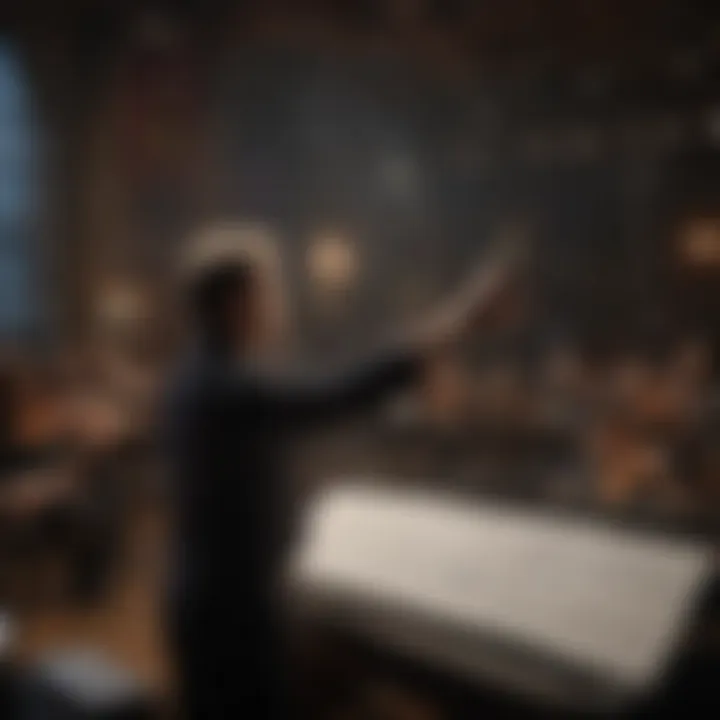Emmanuel Music: A Deep Dive into Its Cultural Impact


Intro
Emmanuel Music stands as a beacon within the classical music arena. Its journey began in a specific cultural context, responding both to historical currents and modern artistic needs. This exploration will highlight its foundational aspects, artistic contributions, and enduring influence on both performance and education in classical music.
Artist Profile
Biography and Background
Emmanuel Music was founded by a group of passionate musicians in the late 1970s. The initial vision centered on making classical music accessible to a wider audience while maintaining a high artistic standard. It originated in Boston and was closely tied to Emmanuel Church, which provided a welcoming space for performances. Under the leadership of its first artistic director, the ensemble began to carve its niche within the classical music landscape, presenting works that spanned centuries and styles.
Major Influences and Inspirations
Throughout its development, Emmanuel Music drew inspiration from a diverse range of sources. The Baroque and Classical eras heavily influenced its repertoire choices. Additionally, the ensemble has collaborated with artists from various disciplines, including contemporary dance and theater. These cross-disciplinary partnerships have enriched their presentations, often leading to innovative interpretations of traditional works.
Contributions to Contemporary Performance
Emmanuel Music is notable for its contribution to the interpretation of classical masterworks in fresh ways. They perform lesser-known compositions alongside staple pieces. This approach not only highlights the breadth of classical music but also shines light on composers who may not have received the attention they deserve.
Cultural Impact
The ensemble's commitment to community involvement has also shaped its cultural impact. By offering educational programs and workshops, Emmanuel Music fosters a deeper appreciation for classical music among younger audiences. Their initiatives are tailored to enhance students’ understanding of music theory and performance, bridging the gap between education and artistic expression.
"Emmanuel Music expands the horizons of classical music appreciation through innovative performance and educational outreach."
Notable Performances
Over the years, the group has presented numerous notable performances. These events often feature acclaimed soloists and a variety of orchestral configurations. Emmanuel Music encourages a collaborative environment where musicians can explore new interpretations and engage with the audience.
Leadership of Artistic Directors
Artistic direction plays a crucial role in the organization's success. Each director brought unique perspectives and artistic goals. Their leadership not only emphasized performance excellence but also prioritized community engagement, setting the stage for Emmanuel Music's ongoing relevance.
Roles of Featured Musicians
The musicians involved with Emmanuel Music have diverse backgrounds. Many are sought-after performers in their own right, contributing their talents to create a vibrant ensemble. This blend of experience fosters an inclusive artistic environment, allowing for experimentation and growth.
Implications for Music Education
By prioritizing educational outreach, Emmanuel Music plays a role in shaping the future of classical music. Their initiatives provide vital experiences for aspiring musicians and students. This commitment ensures that classical music continues to thrive in new generations while remaining rooted in its rich traditions.
Finale
In summary, Emmanuel Music represents a vital part of the classical music community. Its pioneering work continues to inspire musicians and enrich the cultural fabric. Future analysis will delve deeper into specific repertoire choices and collaborations, providing additional insights into the organization's ongoing contributions to music education and interpretation.
For further exploration of Emmanuel Music's significance, you can visit their official website or educational resources on Wikipedia, Britannica, and discussions on Reddit.
Prelims to Emmanuel Music
Emmanuel Music holds a significant place in the realm of classical music, not only for its rich history but also for its commitment to contemporary performance and education. This section sets the stage to understand Emmanuel Music's role within the landscape of cultural expression.
Exploring Emmanuel Music allows readers to appreciate how it emphasizes the transformative power of music. The organization is dedicated to bridging the past and present through innovative programming that includes performances, engagements with various composers, and education initiatives. Overall, it provides a compelling illustration of how classical music can evolve while still honoring its foundational roots.
Historical Background
The roots of Emmanuel Music trace back to the mid-1970s, when Craig Smith established the ensemble within the Emmanuel Church in Boston, Massachusetts. Initially, the organization focused on Baroque and classical repertoires. Over the years, it evolved into a vibrant platform showcasing both well-known works and newly commissioned pieces.
This evolution illustrates the adaptability of Emmanuel Music to the changing dynamics of music and audience preferences. The ensemble has become synonymous with high-caliber performances and artistic integrity, growing from local to national recognition.
Core Values and Mission
Emmanuel Music is anchored in core values that direct its mission. These include dedication to artistic excellence, community engagement, and educational outreach. By nurturing the intersection of performance and pedagogy, Emmanuel Music aims to elevate the appreciation of classical music.
The mission promotes a unique blend of performance and education, making it accessible for a wide audience. Specifically, Emmanuel Music strives to:
- Enhance the understanding of classical music through performances that inspire.
- Cultivate new talent via mentorship and collaborative initiatives.
- Engage the community by making music a shared experience, welcoming diverse audiences.


In summary, this introductory section lays a foundation for delving deeper into the intricate fabric of Emmanuel Music. It emphasizes not only the organization's historical context and values but also highlights its ongoing influence in the classical music landscape.
"Music can transcend boundaries and create connection. Emmanuel Music embodies this ethos through its diverse performances and educational initiatives."
With a clearer understanding of its historical background and core values, readers can appreciate the depth of Emmanuel Music's contributions to both the local and broader music community.
Foundational Figures
Foundational figures are essential in understanding the development and success of Emmanuel Music. These individuals shape the vision, direction, and creative output of the organization. Their influence extends beyond personal talent, driving the collective ethos that defines Emmanuel Music. Recognizing their contributions provides insights into the dynamics of artistic leadership and the collaborative spirit that has characterized this institution.
The Founder: Craig Smith
Craig Smith is the pivotal figure in the establishment of Emmanuel Music. His vision laid the groundwork for a unique approach to classical performance that integrates the sacred and the secular. Smith’s commitment to excellence and innovation has driven the organization’s growth and adaptation over the years. He fostered a community that encourages musicians and audiences alike to engage deeply with the music. Smith’s legacy continues to resonate through the performances and initiatives of Emmanuel Music, inspiring future generations of performers.
Significant Contributors
Significant contributors have played a vital role in sustaining and expanding Emmanuel Music's mission. These contributors span various categories, including musical directors, featured composers, and guest artists. Each group brings distinct strengths and perspectives that enhance the organization’s repertoire and performance.
Musical Directors
Musical directors shape the artistic vision of Emmanuel Music. They curate the repertoire, ensuring a diverse and engaging selection that resonates with audiences. Their leadership not only influences the performance quality but also cultivates an environment of artistic growth for musicians. A key characteristic of musical directors here is their adaptability; they must navigate the evolving landscape of classical music, balancing tradition with innovation.
The unique feature of musical directors at Emmanuel Music is their collaborative nature. They work closely with performers, fostering an inclusive atmosphere where creativity flourishes. This collaboration is beneficial for the organization because it leads to compelling performances that reflect a collective artistic identity. However, the challenges in seeking new talent while maintaining high standards can sometimes create tension, requiring directors to be both discerning and open-minded.
Featured Composers
Featured composers add significant value to Emmanuel Music through the creation of new works and arrangements. Their compositions often reflect contemporary issues and community sentiments, bridging the gap between classical traditions and modern themes. One of the key characteristics of featured composers is their willingness to experiment; they push boundaries and explore new musical dimensions.
The advantage of featuring composers in Emmanuel Music’s programming is the infusion of fresh perspectives into the repertoire. Engaging with contemporary composers attracts a broader audience and stimulates dialogue within the musical community. However, collaborating with living composers can sometimes be difficult, as their availability and visions may not always align with performance schedules.
Guest Artists
Guest artists bring diversity and expertise to Emmanuel Music performances. They often introduce new styles and techniques, enriching the overall experience for both performers and audiences. A key characteristic of guest artists is their accomplished backgrounds, often presenting unique interpretations of classical pieces.
The inclusion of guest artists is beneficial for the organization as it allows for collaborations that can lead to innovative programming and unforgettable performances. Their distinct contributions often leave a lasting impression on the audience. However, integrating guest artists into established ensembles can pose challenges, such as balancing their interpretations with the ensemble’s identity and cohesion.
The role of foundational figures in Emmanuel Music can significantly influence its trajectory, shaping the future of classical music performance and education.
Musical Repertoire
The musical repertoire of Emmanuel Music plays a pivotal role in understanding its significance within the classical music landscape. It encapsulates a wide array of compositions and styles that not only showcase the organization's commitment to diverse expression but also elevate the expectations of contemporary performance. Through its repertoire, Emmanuel Music reflects both the cultural heritage of classical music and the innovative spirit of modern interpretations.
Diverse Genres Represented
Emmanuel Music is known for its expansive selection of genres, from baroque to contemporary classical. This variety ensures that the performances remain fresh and engaging for audiences and performers alike. The inclusion of less frequently played works broadens the musical horizon for both listeners and musicians.
Several genres are regularly featured:
- Chamber music: Offers intimate settings that foster a unique connection between performers and the audience.
- Opera: Provides a rich emotional landscape ripe for exploration and expression, often with dramatic storytelling.
- Innovative arrangements: These can reimagine traditional works, bringing new life and perspectives.
This commitment to genre diversity encourages musicians to explore various techniques and styles, enriching their skill sets and fostering a culture of collaboration.
Signature Works
Signature works within Emmanuel Music's repertoire often highlight the virtuosity and depth of talent within the ensemble. These pieces are chosen not just for their popularity, but for their ability to resonate with the ensemble's artistic identity and mission.
Works by composers like J.S. Bach and Samuel Adler are prominent. Bach's intricate compositions challenge performers and reward audiences with their complexity. Adler's modern pieces push boundaries, inviting discussions about contemporary issues through music. Having such a repertoire allows Emmanuel Music to create a dialogue with its audience, offering them both familiarity and novelty.
Commissioned Pieces
Emmanuel Music invests in commissioning new works, thus contributing to the contemporary classical music scene. By engaging with living composers, they ensure that the repertoire is not static but continues to evolve. This initiative serves several purposes:
- It promotes creativity and innovation within the arts.
- It cultivates relationships with composers, enriching the cultural landscape.
- It encourages audiences to engage with new ideas and perspectives in music.
The pieces commissioned often reflect current themes, pushing societal boundaries and prompting reflection. This dedication to new works positions Emmanuel Music at the forefront of modern classical music, making it an essential player in today's cultural dialogue.
"A music organization’s repertoire is the heart of its identity; it defines the artistry and intention behind each performance."


Notable Performances
Notable performances form the backbone of Emmanuel Music's identity. They showcase not just the talent involved, but also the organization’s commitment to advancing the appreciation of classical music. Each performance is an opportunity to connect with audiences on a deeper level. They highlight the artistry of musicians and their power to evoke emotions through sound.
Annual Concert Series
The annual concert series is a keystone event, demonstrating the exceptional capacity of Emmanuel Music to draw in diverse audiences. These concerts typically feature a wide range of repertoire, presenting significant compositions that span various periods and styles.
Every year, attendees look forward to premier works and established classics. The blend of familiar and new pieces fosters a deeper connection with both seasoned music lovers and newcomers. The result is an immersive experience where the audience can appreciate the nuances of live performance, enhancing their understanding of each piece performed.
Collaborative Performances
Collaboration with other ensembles and artists amplifies the uniqueness of Emmanuel Music's performances. By joining forces with orchestras, choirs, and soloists, Emmanuel Music creates innovative interpretations of works.
These collaborative performances allow for fresh perspectives and broader artistic expression. For instance, the combination of different musical backgrounds brings new life to traditional works. It attracts a varied audience, stimulating interest across different demographics. These performances exemplify the synergy between artists, highlighting the beauty of collaboration in the arts.
Special Events
Special events are organized to celebrate milestones or unique themes. They often include thematic concerts that explore specific musical eras or composers. These occasions are designed to educate as much as they entertain.
Sourcing expert speakers and artists with deep knowledge of the subject matter enriches the experience for the audience. For music students and aspiring musicians, these events act as learning opportunities, providing insight into the creative process involved in performance.
"Every performance is a lesson in history, a live testament to composers' legacies, and an invitation for listeners to engage with music on a profound level."
In summary, notable performances at Emmanuel Music represent a harmonious blend of artistry and education. They effectively communicate the importance of live music while fostering engagement with classical music heritage. Without these performances, the cultural fabric of the community would be far less vibrant.
Intersection of Education and Performance
The relationship between education and performance in the realm of music is crucial. Emmanuel Music embodies this intersection through its commitment to not only showcase exceptional performances but also to enrich the educational landscape. Numerous benefits arise from this dual focus. Musical training fosters both personal and artistic growth, nurturing aspiring musicians while enriching the audience's experience.
Accessible educational programming is essential in broadening the reach of classical music. By integrating outreach efforts with performance opportunities, Emmanuel Music ensures that diverse communities can engage with music. This engagement serves not merely as passive observation but as an active participation in cultural dialogue and artistic expression.
Attention to educational initiatives can also culminate in the discovery of new talent. Musicians at various stages of their career benefit from performance experiences that mirror professional environments. Such settings instill key values like discipline, collaboration, and creative thinking.
"The intersection of education and performance is vital for fostering not only skill, but a lifelong passion for music. It bridges gaps between learning and expert execution, ultimately enriching both performers and audience alike."
Through these educational engagements, Emmanuel Music cultivates a generation of informed audiences and talented musicians alike.
Outreach Programs
Emmanuel Music implements a variety of outreach programs aimed at different communities. These programs may include workshops, masterclasses, and open rehearsals. By providing these opportunities, Emmanuel Music actively engages with the local population, breaking down barriers often associated with classical music.
The workshops enable participants to explore the technical aspects of performance. Hands-on experiences allow individuals, especially students, to appreciate the craft involved in music creation. Furthermore, open rehearsals invite amateur musicians and interested listeners to witness the complexities of preparation before a formal concert occurs.
This commitment to outreach not only enhances technical proficiency among participants but also fosters an inclusive environment. It helps to demystify classical music, inviting audiences from various backgrounds to participate. By integrating outreach initiatives with established performances, Emmanuel Music reiterates the importance of education in the preservation and evolution of musical traditions.
Artist Mentorship Initiatives
Artist mentorship is another pillar of Emmanuel Music's educational efforts. Through mentorship initiatives, established musicians share their expertise with emerging artists. This guidance is fundamental for the growth of the mentees, who benefit from direct interaction with experts in their field.
The mentorship arrangements take various forms. They may consist of one-on-one coaching sessions, collaborative projects, or even informal discussions after performances. Each approach encourages an exchange of ideas, expanding the understanding of nuances within music.
Moreover, these initiatives often spark collaborative work between experienced musicians and emerging talent, leading to innovative outcomes. Mentees gain valuable insights into the music industry and performance practices, enhancing their confidence. Such interactions inspire a new generation to pursue their passion for music, continuing the rich legacy of Emmanuel Music.
Community and Cultural Impact
The community and cultural impact of Emmanuel Music is significant and multi-faceted. This organization not only contributes to the classical music scene but also enhances the cultural fabric of the communities it engages with. Emmanuel Music acts as a bridge between musicians and audiences, fostering a deeper understanding and appreciation for the art form. The importance of this topic lies in recognizing how music can serve as a catalyst for social connection, education, and cultural exchange.
Local Engagement
Local engagement refers to Emmanuel Music's effort to connect with its immediate community. Through various outreach initiatives, the organization strives to include individuals from diverse backgrounds. This approach introduces classical music to non-traditional audiences, enriching the cultural offerings available in the region. For example, Emmanuel Music often collaborates with local schools, offering workshops and performances tailored for students. These programs cultivate interest in the arts and often provide students with their first exposure to classical music.
Additionally, community concerts hosted at local venues showcase talent while inviting participation from residents. These events eliminate the barrier that can sometimes exist between performers and audiences, creating a more accessible musical experience. In this way, Emmanuel Music invests in its local community, monitoring its needs and preferences to ensure programming resonates well.
Global Reach


Emmanuel Music’s global reach illustrates its commitment to the wider international classical music community. This reach enhances its reputation and creates opportunities for cross-cultural collaboration. Collaborations with international artists often bring fresh perspectives, contributing to a rich tapestry of musical expression that honors both tradition and innovation.
The organization has also engaged in partnerships with various music festivals worldwide, further amplifying its influence. This not only enriches the repertoire but also provides unique platforms for emerging artists to showcase their work. By participating in global forums, Emmanuel Music elevates its voice while spreading awareness about the importance of contemporary classical music in various cultures.
Influence on Music Appreciation
Emmanuel Music has a notable influence on music appreciation, particularly in how classical music is understood and experienced. The organization promotes educational initiatives that demystify classical works, making them accessible to a broader audience. Through concert programs that explain the context and significance of the pieces being performed, Emmanuel Music enhances listener understanding.
Educative discussions held before and after performances encourage audience engagement. This interactive approach promotes a dialogue surrounding the pieces, encouraging listeners to form personal connections with the music. Moreover, the incorporation of contemporary works alongside traditional repertoire broadens the audience's perspective, illustrating the ongoing evolution of this musical genre.
"Emmanuel Music serves as a model for how art can shape communities, fostering appreciation for music while enriching lives both locally and globally."
Challenges and Adaptations
The realm of classical music is not static; it is influenced by many factors that require adaptation. Emmanuel Music, like many organizations in this field, faces challenges and must find ways to navigate them. Understanding these challenges sheds light on the resilience and creativity needed in the world of performance arts. The dual focus on financial constraints and the necessity to integrate technological advancements is crucial for sustaining a vibrant music community.
Navigating Financial Constraints
Financial limitations are a persistent challenge for non-profit organizations, including Emmanuel Music. Funding often relies on donations, grants, and ticket sales. The economics of running a musical ensemble can be daunting. For instance, competitive salary structures and production costs can deplete limited resources.
To navigate these constraints, Emmanuel Music employs several strategies:
- Diversified Funding Sources: They seek a mixture of grants and donations, involving the community in fundraising events.
- Cost-Effective Collaborations: Partnering with local musicians and schools helps to reduce individual costs while enhancing the communal feel of performances.
- Engagement with Sponsors: Cultivating relationships with businesses can lead to sponsorship opportunities, providing essential financial support.
These approaches not only alleviate financial pressures but also strengthen ties with the community, making everyone feel involved in the music experience.
Technological Advancements in Performance
Technology has transformed how music is produced, performed, and consumed. Emmanuel Music recognizes the importance of embracing these changes. They integrate technology into their performances and processes to enhance both audience experience and operational efficiency.
Some of the technological advancements include:
- Live Streaming: Offering performances online allows for broader audience access, especially in situations where attending in person is challenging.
- Audio Recording Innovations: High-quality recordings contribute to better preservation of performances and increase visibility through digital platforms.
- Virtual Collaborations: With recent advancements in communication technology, virtual collaboration becomes a reality. Musicians can connect and create from different locations, expanding the creative process.
"Emmanuel Music adapts to technology while maintaining commitment to artistic integrity."
These advancements open up new avenues for artistic expression and audience engagement, contributing to the organization's ongoing relevance in the contemporary cultural landscape. In summary, by overcoming financial challenges and embracing technology, Emmanuel Music not only survives but thrives in a complex environment.
Future Directions
Future directions for Emmanuel Music are significant as they signal the organization's path forward in an ever-evolving musical landscape. As trends change, it is crucial for institutions like Emmanuel Music to adapt while preserving their core mission. The upcoming programming initiatives and collaborations will play a vital role in enhancing audience engagement and expanding the reach of classical music.
Innovative Programming
Innovative programming represents a cornerstone of Emmanuel Music's strategy for future growth. By integrating diverse genres and modern compositions, the organization can attract new audiences. This approach not only broadens the traditional classical music repertoire but also allows musicians to experiment with new forms of expression.
As a practical example, Emmanuel Music might develop themed concerts that showcase contemporary composers alongside classical masters. This could create a dialogue between eras, offering listeners fresh perspectives on familiar works. Additionally, incorporating multimedia elements or interactive experiences could further engage a younger demographic.
The emphasis on innovation aids in fostering a community of music lovers who appreciate both the historical context and the dynamic potential of music today.
Expanded Collaborations
Expanded collaborations are another promising direction. Partnering with other organizations—such as local arts groups, educational institutions, and even diverse cultural entities—can enhance Emmanuel Music's overall impact. These partnerships can introduce a variety of artistic perspectives and skills that enrich the main offerings.
For instance, collaborations with dance troupes or visual artists could create multi-dimensional performances that invigorate the classical music scene. Furthermore, joint ventures with universities can foster educational programs that provide students with hands-on experiences.
The End
The conclusion provides an essential wrap-up of the insights gained from exploring Emmanuel Music. This article highlights not just the historical and cultural context surrounding this esteemed organization, but also its significant contributions to the world of classical music. By synthesizing the various elements discussed throughout the sections, we can appreciate the enduring legacy of Emmanuel Music and its impact on both performers and audiences alike.
Reflections on Emmanuel Music's Legacy
Emmanuel Music stands as a testament to the fusion of education, artistry, and community engagement within classical music. It has continually pushed the boundaries of concert performance, evolving to meet the needs of contemporary audiences while remaining grounded in historical practices.
"Emmanuel Music is not just about performance; it is about creating a space where music and community can grow together."
Through its diverse array of programming and initiatives aimed at music education, the organization plays a pivotal role in fostering talent and promoting appreciation for classical works. The collaborations it forges with artists and institutions further extend its influence, ensuring a broad reach that resonates beyond its immediate locale.
Key considerations regarding its legacy include:
- Innovative Programming: By reprising lesser-known works alongside contemporary pieces, Emmanuel Music ensures a refreshing and impactful concert experience.
- Educational Outreach: The organization actively engages in mentorship and outreach programs, cultivating the next generation of musicians.
- Cultural Relevance: Its efforts in addressing modern themes through collaboration and repertoire selection reflect a commitment to keeping classical music relevant and engaging.
In summary, the legacy of Emmanuel Music is not defined solely by its historical contributions but rather by its ongoing commitment to music education and community. As it looks towards the future, the potential for continued growth and impact remains vast, ensuring its role in shaping the classical music landscape for years to come.







